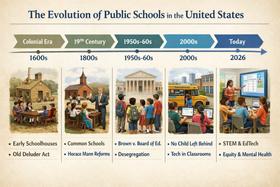Although the civil rights movement played a pivotal role in this nation's history, the subject is often merely skimmed over in primary and secondary schools today. However, Mississippi hopes to change that trend by requiring civil rights lessons for all public schools, grades K-12. The lessons were signed into law five years ago by Mississippi Governor Haley Barbour, but implementation will go into effect for the 2011-2012 academic year. The curriculum was delayed so that it could be fit into a full revision of the state's social studies framework that goes into effect this year.
The First to Require Civil Rights Curriculum
Mississippi officials believe they may be the first state to implement such a requirement, according to a report in the Atlanta Post. Students will answer civil rights questions on state assessment exams necessary for graduation from high school. While this addition will ensure civil rights are taught in schools, how the lessons are taught will in large part be up to individual teachers.
Chauncey Spears, who works in the Mississippi Department of Education's curriculum and instruction office, said school districts can tailor textbooks and other course materials to match what will be taught. Spears added that some resources for the curriculum might be donated from a variety of sources. Teachers could also opt for class trips to historic sites or bringing former activists from the movement in to talk to students.
Jennifer Weeks, DeSoto County's associate superintendent of curriculum, told the Associated Press that teachers in her area were excited about the possibilities. Weeks said, "With our proximity to Memphis and access to resources such as the Civil Rights Museum, our students can not only learn about an important era in our nation's history, but they can also learn a great deal about the history of this region."
The Importance of Civil Rights Lessons
Civil rights have traditionally been a part of social studies curriculum at schools across the country. However, schools that include this component may do so in a single elective class or by touching on it around the time of Martin Luther King Jr.'s birthday. Mississippi is hoping to buck that trend by making civil rights an integral part of their curriculum, beginning in kindergarten and going all the way through the secondary grades.
Barbour told the Associated Press, "To not know history is to repeat it. And to learn the good things about Mississippi and America and the bad things about Mississippi and America is important for every Mississippian."
John Payola, a history teacher in a primarily African American high school in southern Mississippi, agrees with Barbour. Payola has been incorporating civil rights into his lessons for years, and he has educated his students about the various activists in the state who have led peaceful demonstrations for change. Payola also helped write the new curriculum that will be incorporated into all Mississippi public schools. This teacher believes that implementing civil rights lessons into curriculum is essential because, "Every year the movement loses momentum."
"What I find in this level of class, they know who the people are, but they don't understand the story," Payola told Nola. "They're old enough to see racism on the street. They get angry. I love when they get angry. It really pushes the nonviolent discussion."
Opposition to the Requirement
While many teachers and administrators are applauding the addition of the civil rights requirement, not everyone in the state is happy about the change. According to a report at Think Progress, one of the state's representatives is concerned about how this requirement will change the quality of education in Mississippi schools. Rep. John Moore, R-Brandon, said, "I want schools to be teaching my grandchildren to read, write a complete sentence and do math."
Moore added that it is important to know who is writing the textbooks and craft the material being taught. He added, "I just want to make sure it's teaching the truth and facts and not being accusatory of one group of people or the other. I don't want it to be someone's philosophical idea of what civil rights are." Moore has filed a bill to repeal the law every year since 2006, but to no avail.
If everything goes as scheduled, Mississippi will be the first state to make civil rights teaching an integral part of their history courses. With assessment tests to cover the major points of the subject, students in the state will not graduate from high school without a basic knowledge of what the movement stood for and who the major players were. Perhaps other states will join the move to make civil rights a more significant portion of American history that is taught today.












